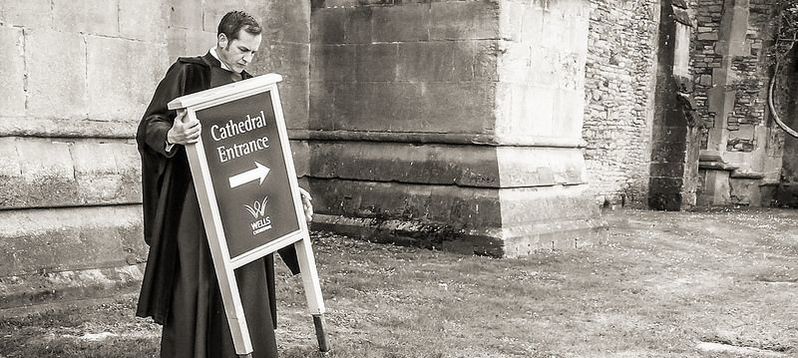|
-Rev Melissa Fain- Months ago I connected our inability to see church decline with the growth of the mega-church. Basically, congregants go where the resources are. Most don't understand the problem, because from their view there isn't one.
Eighty is the magic number in understanding church decline. About thirty years ago eighty percent of churches are small, but eighty percent of congregants go to a large church. Eighty percent of churches are dying. This problem was first seen in, you guessed it, the eighties. Going where the resources are is increasingly about going to mega-churches- because they are increasingly the one ones who can do things. I'd be interested to see that 80/80 statistic redone. I'd guess that it has changed as smaller congregations are dying out, and more and more are forced into larger churches. As churches try to understand the problem, ministers are neck deep in it. Here are some blunt truth about ministers today and what they are currently living through:
-Rev Melissa Fain- This was supposed to be a sermon I was going to write and record. Then the Pennsylvania Grand Jury report hit, and it all of a sudden seemed relevant now. 1“I am the true vine, and my Father is the vineyard keeper. 2 He removes any of my branches that don’t produce fruit, and he trims any branch that produces fruit so that it will produce even more fruit. 3 You are already trimmed because of the word I have spoken to you. 4 Remain in me, and I will remain in you. A branch can’t produce fruit by itself, but must remain in the vine. Likewise, you can’t produce fruit unless you remain in me. 5 I am the vine; you are the branches. If you remain in me and I in you, then you will produce much fruit. Without me, you can’t do anything. 6 If you don’t remain in me, you will be like a branch that is thrown out and dries up. Those branches are gathered up, thrown into a fire, and burned. 7 If you remain in me and my words remain in you, ask for whatever you want and it will be done for you. 8 My Father is glorified when you produce much fruit and in this way prove that you are my disciples. -John 15:1-8 CEB- My watch vibrates me awake at 5:15 in the morning, just as it always does every week day. Bleary eyed, I turn the alarm off, get up and begin my morning ritual. I start my coffee, turn on my computer, and check out what’s happening on the subreddit, /r/Christianity. “Is it me or God?” “I’m scared and overwhelmed with anxiety.” “My mom has cancer.” These are real titles that greet me as I sift through the posts, and decide where I’m going to comment. Many of these I’ll leave be, as some great users have already given some great advice and emotional support. There are some good ministers on the internet. Sometimes I step in just to let the user know I’m saying a prayer for them. Sometimes I step in, because there are always trolls lurking, and they say stupid and hurtful things to those who show up online hurt and broken.
Then there are the ministers trying out the internet. Full forty minute sermons show up all the time in YouTube format. Those are never watched and always end up beyond zero- though we have no idea how far beyond zero, because reddit doesn’t go to the negative on posts. I always shake my head at those, because it’s clear this is an evangelism tool where the minister never got to know the community before trying to evangelize to it. The short 15 min videos are sometimes watched, and almost always brutally responded to.It’s harsh and real. Really smart people are pushing in the right ways. They are pulling apart the bad theology. It’s like looking in a 360 mirror. It makes a person resolved and stronger, or forces them out. All the good ministers on Reddit started out as one of these critiqued newbies. It’s a rite of passage if you want to stick around. It’s also a way to protect those who were wounded. I’m a minister called to the wilderness of the new wild west, called to those who have digitally come to learn, grow and heal. Especially heal. The internet is where many of the individuals broken by the church go. I'm not the first "Minister of the internet TM." I’m not even the first in our denomination. That title goes to Rev. Debbie Adams-Phelps. It was also not the call in which I anticipated to find myself. For me, starting online was only supposed to be the diving off point. I had it all figured out. I’d announce Fig Tree’s launch. I’d write a few meditations. Start a Facebook page. Get Twitter up and running. It would be awesome. A few months later we would physically launch and everything would be amazing. Then no one showed up for the launch. I was left with an internet site, and some social media connections. It was sad. I’m sure many would give up and move on at that point. I gave it the good ol’ college try, right? But, you’d be wrong. I did something unheard of. I listened and learned. Instead of packing up shop, I learned what the people were doing and saying online, and I began to talk about the love of Christ in a language they could understand. Some of that was how the language looked. Three quarters of the words we use online are not even understood outside church doors. Some of that was how the language acted. The internet is snarky. It requires seeing things as jokes instead of taking them seriously. One day a user tagged me with the title #ladypastor. That was my moment. Was he being intentionally cruel, or was it a genuine statement of my calling. I took it as a compliment, and everything changed. People began to seriously talk with me; not at me. In that moment, I began to learn the real trauma of the Christian internet. John 15 sets up something that is really comforting. Being connected to Christ is like being connected to a vine. We are nourished and we grow on that vine. If pieces of us are cut, it is for our growth, not our death. Sometimes it’s important to hear we need to let go of something healthy so an even greater health can take its place! It’s also important to hear that things that hindered us, and kept us from growing need to be let go as well. What I found online were complete branches, healthy Christians, lopped off the vine due to church trauma. There was confusion regarding why their faith was drying up, and why entering a new church didn’t naturally attach them to the Spiritual vine they used to drink from so deeply. More than that, I could relate. I was cut from the vine, and returned to a land that was no longer my own. In 2010 I was called to a small rural church. By the looks of it, it was a great fit. They answered all my questions correctly, and they seemed to be searching for the talents and gifts I had to offer. Unfortunately, the church was broken. This had slipped through the Regions purview because the church had just been moved into a new region, having the old region dissolved. There were ways I could have known. Looking at old yearbooks to see the quick turnaround for ministers was the easiest way. It was my first and only full time call, and when everything went down our family was left homeless, jobless, and with a newborn baby to care for. Also, when we moved back to the Georgia region the regional minister called to welcome me back, but gave me the tough news. He was leaving within weeks. I was coming home to a state in transition, to people who no longer knew me, and frankly, I didn’t know who I was either. Ministers don’t want to talk about their own trauma. I think there’s this fear of looking weak. I probably would have been the same way, but I could relate with those hurt and bruised voices online. I knew what these broken congregants were saying, and I knew their pain. So, I began to get honest. Brutally honest. I knew what it was like to feel the weight of depression, and not have the money or resources to seek counselling. I told that story. I told the story of having just enough pennies to purchase food for the week. I visited churches to get a feel for my new county. I felt hurt by the local church. I would be ignored time and time again when I'd visit with just myself and my son, but giving too much attention when my husband and daughter would tag along. People thanked me because my stories told them they were not alone. They too had had these experiences. My trauma as a minister was helping them heal. The church has a problem. The hashtag, #ChurchToo was created to show sexual abuse on the heals of #MeToo, but people have been using it to show abuse in general. The pain is deep and wide. The recent Grand Jury report truly shows that. These people know that immense feeling of being connected to the vine- to God. Then, trauma happens or it continues to happen, and the person finds themselves disconnected. Instead of cutting away the bad parts, we cut away the people that are too close. The church is dying because when you do that, you are taking away the people who gave life to the church, and leaving the pieces that can give little or nothing back. You can't do that. God is the vine, but Christ is the Son. Without a way for the Son to shine on the church and feed the Church with energy- the church dies. Listen, I know God can breathe new life into theses dried up branches. I know this message was not meant for a General Assembly. It was meant for us. It was meant for those who wonder how they will ever properly connect again. You are not alone, and my focus is on finding new health for those who are with you. -Rev Melissa Fain- Ever hear the phrase "the Bible is a double edged sword?" That's because it's technically from the Bible, specifically, Hebrews 4:11-12. 11 Therefore, let’s make every effort to enter that rest so that no one will fall by following the same example of disobedience, 12 because God’s word is living, active, and sharper than any two-edged sword. It penetrates to the point that it separates the soul from the spirit and the joints from the marrow. It’s able to judge the heart’s thoughts and intentions. The "word of God" means, in this case, the words spoken specifically by God. Simply put: What God says is truth, and it will cut through the BS. But, so many choose to translate this text to specifically be talking about the bible, so let's talk bible. I think every word in the bible has the capacity to be a double edge sword. How? In the right hands, the Bible is a surgeon's tool, able to cut out the damage and leave the justice, peace, and Salvific Love of Christ. In the right hands, the Bible is a cook's tool, able to prepare us to become something amazing. In the right hands, the Bible is an artist's tool, cutting away the unneeded parts; refining parts. The Bible is like a sword. When properly wielded and used as a tool, it can be a wondrous document. You don't want to give someone with no skill something that can separate the soul from the spirit and the joints from the marrow. In the wrong hands, the Bible is a bomb, crumbling faith to dust. It leaves a person without even a solid foundation on which to build. In the wrong hands, the Bible is a battle sword, piercing the heart, and stopping compassion; lopping off Body parts haphazardly and without care. In the wrong hands, the Bible can still be a good tool but in amateur hands a meaningful act can still deeply wound. If you read all of Hebrews 4, you would realize what was meant by using the word "rest." At the beginning of the chapter, the words of God at Creation are used and (just a few verses later) sat against disobedience not getting rest because God cut them out. Now some has taken that to be a legalistic mandate to cut others out instead so rest will belong them. But, that's not what Hebrews 4 is saying. It's not our word. It's not our ability to choose who's in and who's out. It belongs to God. The disobedience doesn't belong to those beautiful heathens on the outside. That word belongs squarely on our incredibly misguided shoulders. Rest is achieved by remaining a faithful community. It's really hard to be a faithful community when we've pushed or cut out members from within it. That's why we need to realize the power of our words. After all, at it's most basic level, the Bible is a collection of words. Just as a collection, the bible holds no power. It's as helpful or as dangerous as a dictionary or thesaurus. The words themselves hold no power. It's the meaning behind the words that choose whether you are wielding a bomb or a balm.
Which do you have? Are you sure? -Rev Melissa Fain- I wish to preface this. I don't personally have an Uncle Felix, or if I do I have no recollection of it. I also don't know another Uncle Felix in another family. The name was chosen to be generic. Also, I should give a trigger warning for family and church abuse. I'm the type of person who needs to understand actions and reactions. Often times the action itself are not as important as the reason that action was taken. It keeps me from drawing lines in the sand and putting the entire world against me. We live in a very reactionary world. It's easy to write off, or choose to dislike, someone based on a past action. It's easier to hold them accountable for what they've done, without understanding the reasoning behind those actions. The actions themselves could be superfluous in relation to the motivation. This brings me to poor ol' Uncle Felix. Uncle Felix was beloved in the family, but a little off. Every family reunion he'd sit and tell jokes about family members who have since passed on. He's nostalgic that way. He always praised the pie, and always exclaims that they need to do a family pie contest one year. When he finishes eating, you could find him with the other guys on the porch smoking a cigar. But there was a problem... After a reunion, one of the moms found her daughter crying in her room. Trying to peel the information away, the daughter was ashamed. Eventually the mother hears something horrible: Uncle Felix had inappropriately touched her. The mother knows it's true, because Uncle Felix had done the same thing to her when she was a kid. Hugging it out with her daughter, but not sharing her story, she is without words what to do. Here's where the average person, sitting outside this situation has clear answers. You directly talk to Felix. You call the police, or at least get a professional third party involved. You take healthy action towards wholeness. This is very difficult to see when the abuser and the abused lives in the same family system. Yes, the family wants to keep their daughters safe, but they also love Felix. If they call the police, Felix would be put on the sex offender list at the very least. At the most, the poor old man would be in prison. (It's here I'm going to stop for just a moment. I'm not justifying anything. I'm trying to understand actions and reactions. I'm going to turn this to church in a moment, because I don't think we've been framing these discussions correctly. So, if you need to, walk away: Take a breath, and please come back.) The family quietly talks about what to do. They decide to keep the kids separated from the adults. Have their activities, and adult activities in different areas. If anyone sees Felix headed to chat with the kids, they would redirect him to the adults. For this family, the problem was solved. Only the girls struggled with body and self-esteem issues well into adulthood. More than that, Felix wasn't just touching his families girls. He had a history of abuse outside the family too. In the 1950's, Dr. Murray Bowen came up with the concept of Family Systems. The basic idea being that an individual cannot be understood apart from his or her family. The family creates this intense unity that makes it difficult for someone to form a "differentiation of self." The Family System's Institute aptly puts it: Bowen’s theory doesn’t focus on mental illness but on the challenges of being human in the relationships which affect us all. It’s not an easy theory to grasp, as it focuses on the big-picture patterns of a system rather than the narrower view of what causes difficulties for one individual. These ideas invite us to see the world through the lens of each family member rather than just from our own subjective experience; they don’t allow room for simply seeing victims and villains in our relationship networks. Seeing the system takes people beyond blame to seeing the relationship forces that set people on their different paths. This way of seeing our life challenges avoids fault-finding and provides a unique path to maturing throughout our adult lives. Generally speaking, professors have adopted Family Systems to help understand the culture of individual congregations. While I was in seminary I was taught mapping as a way to understand the power structures already present in the system. It's a solid idea, that I've yet to find fault in. This is why one of the big hurdles to overcome, when trying to triage church, is to understand the family systems at play in the smaller, and yes, larger system. I've watched multiple Regional Ministers coach local ministers to just quietly resign instead of dealing with the trauma head on. Then the church re-creates the same trauma again with a new minister. And, the situation goes the other way too. There are horrible ministers out there, that cross boundaries and hurt congregants. The church is coached to ask for the minister's resignation instead of firing him or her. But poor ol' Uncle Felix. When something breaks in the church the church reacts like they are dealing with dearly loved family members, and they spiritually are. It is in the church DNA to guard and protect everyone within the spiritual family. It's really difficult to go against the tidal wave of emotion to do the right thing. The mindset of the congregation is that one side has already felt the pain, while the abuser can be saved future pain. As in, now that the damage is done, how does the system save everyone. Nothing is going to undo the abuse, but something is going to protect the beloved member of the system. Now before you go type up your angry response play this game with me. Imagine a dear loved family member. It can be an aunt, uncle, grandparent, parent; even child. You are told that person was abusive in some way to someone else. Can you start the process to seek justice in the situation no matter what the outcome might be? Now imagine the issue is a dear loved one having abused another dear loved one. Can you do it? When I took the Youth Protection Training with the BSA, I discovered the answer is often 'no." Realize those dynamics are what's at play in churches. This is made the most clear when you realize the best way to heal from a broken family system is to leave it completely. That's what broken Christians have been doing in droves for the past two decades. It's "easier" to let the victim quietly leave, than to fix the abuser's problem. Churches justify this by telling themselves the victim chose to leave, instead of being forced out by neglect. Everything I have shared is the reason there is a disconnect in the conversation. The abused knows how to verbalize his or her abuse, and many have courageously spoken. Many churches even quietly affirm the abuse happened. For example, I can remember a congregant whispering to me, "They did it again." Denominations and churches are aware of the problem, and can name it. It's when we get to the action to fix the problem that everything falls apart. Why?
Because Church is a family system, sometimes literally. It requires us to engage in the problem differently. In a company, they can simply fire the problem. You can't fire a family member, and you can't expect the problem will magically return to normal if a Church could. Instead, we need to see the problem as systemic. How does one fix that? Love. Churches need to see outing abuse as the loving action for the abused AND the abuser. It's time to stop and think with our heart. Yeah, it's scary to think that the most loving action is to seek justice, but it's biblical. Have nothing to do with the fruitless deeds of darkness, but rather expose them. It is shameful even to mention what the disobedient do in secret. But everything exposed by the light becomes visible-and everything that is illuminated becomes a light. This is why it is said: "Wake up, sleeper, rise from the dead, and Christ will shine on you." -Ephesians 5:11-14 Think of it this way: If the church is a family system, we are all connected. We are all guilty in our own way of the past three decades. We could have been the abuser, we could have willfully ignored the problem, or perhaps we protected the abuser to allow the abuse to continue. We must take that guilt to the table, and seek forgiveness and healing. Grace only happens if we are willing to admit we need it. |
Categories
All
Archives
October 2023
|







 RSS Feed
RSS Feed